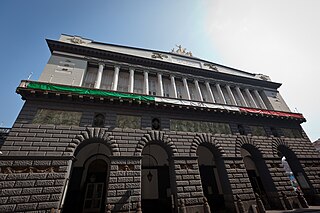

Pasinger Fabrik is a former factory in Munich, Bavaria, Germany, which is used as a cultural centre and event venue nowadays. It is located in Pasing, a quarter in the western part of Munich.


Pasinger Fabrik is a former factory in Munich, Bavaria, Germany, which is used as a cultural centre and event venue nowadays. It is located in Pasing, a quarter in the western part of Munich.
The industrial buildings of Pasinger Fabrik were built in 1895 by the German architect August Exter. Originally, it was used as a manufacturing plant by the Heymann shoe factory, which produced leather shoes. After a fire in 1904, the household appliances manufacturer Ritter acquired the factory. In 1986, the city of Munich bought the buildings to use them for new purposes. [1]
Pasinger Fabrik functions as a cultural centre, featuring the VIEL LÄRM UM NICHTS theatre, a restaurant, and a bar that regularly hosts concerts. It also offers various projects catering to children, adolescents, and families.
The cultural centre presents a diverse range of programs, including performances by theatre groups, comedians, political satirists, and musicians from different genres. Its large gallery frequently showcases temporary exhibitions. Additionally, Pasinger Fabrik houses Munich's smallest opera house, which annually stages one or two operas or operettas specifically adapted for a small cast and orchestra. [2]
The theatre VIEL LÄRM UM NICHTS (named after Shakespeare's play Much Ado About Nothing ) has made an essential contribution to the development of Pasinger Fabrik into the cultural centre it is today.
The theatre was founded by the German actors Margit Carls and Andreas Seyferth in 1985. After working in state and municipal theatres for several years, they decided to set up their own theatre in order to combine the quality you can find in these theatres with a more autonomous, individualistic and collective way of producing. [3]
Such an approach is characteristic for German ‘off-theatres’ or ‘free theatres’, which, similarly to fringe theatres, stand for experimental and unconventional performances. Free theatres usually have much smaller budgets than state and municipal theatres (the most dominant theatre categories in Germany), which rely heavily on public funding. [4] Nevertheless, some free theatres also receive public funding; the city of Munich has supported the theatre VIEL LÄRM UM NICHTS since their first production, for example.
The repertoire of the theatre VIEL LÄRM UM NICHTS consists mainly of their own translations and versions of classic plays. Moreover, dramatisations of narrative texts are frequently performed. Characteristically, the theatre experiments with new stage concepts instead of performing on the usual proscenium stage.
In 1996 as well as in 1997, the theatre was listed as one of the 10 best off-theatres in the German-speaking area by the Impulse Theater Festival in Germany.

An opera house is a theatre building used for performances of opera. It usually includes a stage, an orchestra pit, audience seating, and backstage facilities for costumes and building sets.

Árpád Doppler was a Hungarian-German composer.
Werner Vorndran, known professionally as Fred Delmare, was a German actor.
Ludwig Berger was a German-Jewish film director, screenwriter and theatre director. He directed more than 30 films between 1920 and 1969. Berger began working in the German film industry during the Weimar Republic. At Decla-Bioscop and later UFA he established a reputation as a leading director of silent films. He emigrated to Hollywood, but was unable to establish himself and returned to Europe. He subsequently worked both in France and Germany. He was a member of the jury at the 6th Berlin International Film Festival.

Teodor Currentzis is a Greek-Russian conductor, musician and actor.
Theater Viel Lärm um Nichts is a theatre in Munich, Bavaria, Germany.
Radikal jung – Das Festival junger Regisseure is an annual weeklong German theatre festival at the Münchner Volkstheater, Munich. It began in 2005, as a forum and stage for the next generation of directors.

Rote Fabrik is a former factory in the Wollishofen neighbourhood of Zürich, Switzerland. It is now used as a music venue and cultural centre. It is so named because the buildings are made of red brick, but also because left-wing parties were part of the campaign to turn the location into a cultural centre.
Referendums in Germany are an element of direct democracy. On the federal level only two types of a mandatory binding referendum exist – adopting a new constitution and regional referendums in case of restructuring the states. On the state level, all states have various types of statewide and municipal referendums.
The Buchloe–Memmingen railway is an approximately 45 kilometre long single-track, electrified mainline in the German state of Bavaria. It connects Buchloe and Memmingen and is part of the railway axis from Augsburg to Lindau.
Don Pedro, Prince of Aragon, is a fictional character from William Shakespeare's play Much Ado About Nothing. In the play, Don Pedro is a nobleman who visits his friend Leonato in Messina, Italy after a successful military conquest. Don Pedro helps Claudio to woo Hero and helps set up Benedick and Beatrice who together form the two key couples in the play.
Martin Hellberg was a German actor, director and writer.

Volker Hesse is a German Theatre producer. Between 2001 and 2006 he was the Theatrical Director at Berlin's Maxim Gorki Theater. More recently he has been working in Switzerland.

Ritterwerk GmbH is a German company founded by Franz Ritter in 1905 in Sendling, a suburb of Bavaria’s capital Munich. The company develops, designs and produces tabletop and built-in household appliances in Gröbenzell near Munich.

Beatrice is a fictional character in William Shakespeare's play Much Ado About Nothing. In the play, she is the niece of Leonato and the cousin of Hero. Atypically for romantic heroines of the sixteenth century, she is feisty and sharp-witted; these characteristics have led some scholars to label Beatrice a protofeminist character. During the play, she is tricked into falling in love with Benedick, a soldier with whom she has a "merry war", after rumours are spread that they are in love with each other.

Friedrich Forster or Friedrich Forster-Burggraf, both pseudonyms for Waldfried Burggraf was a German dramatist, screenwriter, dramaturge and actor. His early plays explored controversial subjects, like anti-war sentiment, social reform, and same-sex bonding. When confronted with Nazi censorship, he adapted by authoring two plays perfectly attuned to the government's propaganda requirements. His best-known work is the play Robinson soll nicht sterben! (1932), one of several of his plays later adapted for motion pictures.
Anna Herrmann is a German actor.